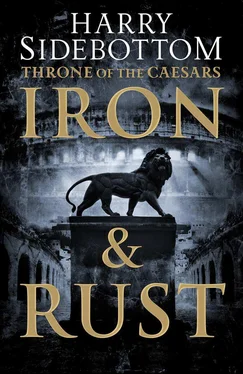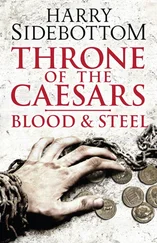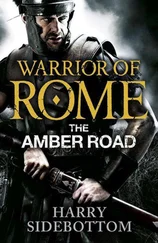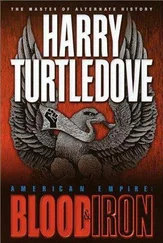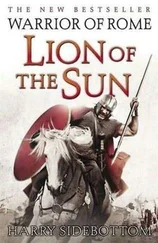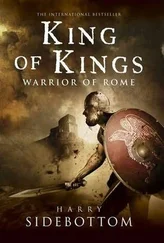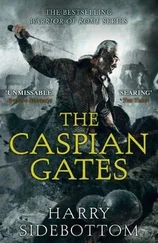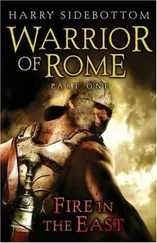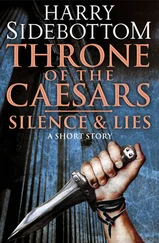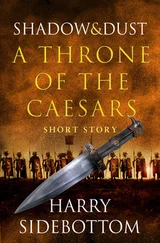Harry Sidebottom - Iron and Rust
Здесь есть возможность читать онлайн «Harry Sidebottom - Iron and Rust» — ознакомительный отрывок электронной книги совершенно бесплатно, а после прочтения отрывка купить полную версию. В некоторых случаях можно слушать аудио, скачать через торрент в формате fb2 и присутствует краткое содержание. Год выпуска: 2014, Издательство: HarperCollins Publishers, Жанр: Исторические приключения, на английском языке. Описание произведения, (предисловие) а так же отзывы посетителей доступны на портале библиотеки ЛибКат.
- Название:Iron and Rust
- Автор:
- Издательство:HarperCollins Publishers
- Жанр:
- Год:2014
- ISBN:нет данных
- Рейтинг книги:4 / 5. Голосов: 1
-
Избранное:Добавить в избранное
- Отзывы:
-
Ваша оценка:
- 80
- 1
- 2
- 3
- 4
- 5
Iron and Rust: краткое содержание, описание и аннотация
Предлагаем к чтению аннотацию, описание, краткое содержание или предисловие (зависит от того, что написал сам автор книги «Iron and Rust»). Если вы не нашли необходимую информацию о книге — напишите в комментариях, мы постараемся отыскать её.
Iron and Rust — читать онлайн ознакомительный отрывок
Ниже представлен текст книги, разбитый по страницам. Система сохранения места последней прочитанной страницы, позволяет с удобством читать онлайн бесплатно книгу «Iron and Rust», без необходимости каждый раз заново искать на чём Вы остановились. Поставьте закладку, и сможете в любой момент перейти на страницу, на которой закончили чтение.
Интервал:
Закладка:
Priscus had spent two days in Amouda reorganizing the order of march. He had gone through it again and again, until he was sure that everyone, from the senior commanders down to the most junior officers, even to the common soldiers, knew their part. He had read the view of the Senator Cassius Dio that Ardashir was of no consequence in himself, and that all the troubles in the East stemmed from the licence, wantonness and lack of discipline of the soldiers. He had met Cassius Dio in the reign of Alexander. What little the Senator knew about soldiering had made him a martinet. True, the troops had murdered Priscus’ predecessor in Mesopotamia. But Flavius Heraclio too had understood nothing about discipline. It took great kindness as well as great cruelty. In Amouda, Priscus had visited the men in their billets, had distributed his own private supplies to the army — choice delicacies and expensive wines — and had had a couple of would-be deserters flogged to death and their corpses strung up over the gates to deter any with similar thoughts.
Well handled — as Priscus knew any force he led would be — the Roman army in the East was still a potent weapon, even in adversity. The problems lay elsewhere. Too many men had been taken away to the wars in the North. And Cassius Dio was wrong: the Sassanids were far more dangerous than their Parthian predecessors. The Persians might marry their daughters, granddaughters — even their mothers — they might kill their wives and sons with impunity, they might throw out the bodies of their relatives to be eaten by dogs, but they could fight.
On the third morning the army had marched out and formed up in a hollow square, with the baggage animals and servants in the centre. Julius Julianus commanded the vanguard with the thousand men of his 1st Legion Parthica, the thousand-strong detachment of 6th Legion Ferrata from Syria Palestina and five hundred auxiliary archers. Porcius Aelianus held the right flank with his thousand men of 3rd Legion Parthica, the two thousand from 15th Legion Apollinaris from Cappadocia and a thousand bowmen. Priscus had entrusted the left to his brother. Philip commanded a thousand legionaries of 4th Scythica from Syria Coele, two thousand auxiliaries armed with spears and five hundred with bows. Manu of Edessa and his levy of five hundred bowmen were also stationed there. The rear consisted of two thousand from 12th Fulminata and a thousand archers, all from Cappadocia, and led by the legate of the legion, Caius Cervonius Papus.
Both flanks of the square were backed by a thousand riders from Hatra. Those on the right were under Prince Ma’na; those on the left a Hatrene nobleman called Wa’el. Prince Chosroes supported the rear with his thousand Armenian horsemen. The final troops — five hundred auxiliary cavalry and the same number of infantry, all from Mesopotamia — Priscus himself led, behind the leading edge of the square.
It was a cumbersome, slow-moving formation, but Priscus had been unable to think of anything better. The close-order infantry could fend off armoured cavalry, and the bowmen could shoot back at horse archers. As slingshots were more effective than arrows against the metal armour worn by Sassanid noblemen, he had called for volunteers. Some two hundred men, porters and sutlers, as well as soldiers, had claimed skill with a sling. These were distributed in small packets all around the army. The Hatrene and Armenians could shoot over the heads of the men on foot. The order of march was far from ideal, but it would have to serve.
The first attack had come within an hour of setting out. Groups of Persian light horse had raced in towards the column. About a hundred and fifty paces out, they had started shooting. Some fifty paces short of the line — well outside the cast of a javelin — they had wheeled around and galloped away, all the while plying their bows over their horses’ tails. One charge had succeeded another almost without cease.
Each foray had slowed the march and claimed a few of the dead and wounded. The former, if they were fortunate, had a handful of earth sprinkled over them and a coin for the ferryman put in their mouths. Beyond that, there was nothing to do but leave the dead where they fell. Those too injured to walk were carried to the centre and mounted or strapped on the mules. Soon the path of the army was littered with the bodies of men and animals and strewn with abandoned baggage.
Progress had been agonizingly slow. Even on half rations, food had run short. It had taken two days to cover some twenty miles to the first unnamed river, another two to cover the same distance to the Arzamon, and a fifth to approach the Chaboras. At the first two crossings the Persian armoured cavalry had feinted a charge as the army struggled through the water, hoping to disrupt the lines enough to press home the attack. Priscus and the other officers had patrolled the column, shouting themselves hoarse. Somehow, panic was held at bay, cohesion maintained. The Sassanid nobles had turned their horses and, in good order, cantered away.
The Romans would have to face down their fears again before they gained the far bank of the Chaboras. Many more men would die before they reached the temporary safety of Resaina. The futility of it all dragged at Priscus. They should have accepted the offer of Ardashir, handed over Singara and Nisibis. Of course, it would have been unpleasant for the inhabitants, and the truce would have been temporary. The Sassanid was committed to conquering as far as the Aegean, and Rome would have had to try to retake the cities, and exact revenge besides. But it would have given the armies of the eastern provinces time to send an expedition west, and place Serenianus on the throne. Maximinus was bleeding the empire white for his unwinnable northern war. Priscus had served on the Rhine. There were many tribes in the North. You used money and the threat of the legions to keep them at each other’s throats. In the East, there was just the King of Kings. You could set all the other rulers of the Orient on him — the Kings of Armenia and Hatra, the Lords of Palmyra, any other petty potentates you could find — and Ardashir would defeat them all, and still unleash his horsemen on the imperium . The real threat to Rome was the house of Sasan.
Priscus prided himself on clear-sighted realism untrammelled by sentiment. Last autumn, even his brother had been horrified by his proposal. That was why he had left Philip in Mesopotamia, when he had gone to Samosata. Priscus accepted he had mishandled that meeting. He should have known the sloth and cowardice of Junius Balbus and Otacilius Severianus would not be moved by appeal to patriotism or advantage. Even his friend Timesitheus had not spoken out. Now the opportunity had gone, and all that was left was the residual danger of denouncement.
‘Infantry ahead.’
Priscus realized he was tired, his mind wandering.
The front line was less than a couple of hundred paces from the Chaboras, almost in effective bowshot.
‘Archers ready.’ Priscus called.
As they trudged forward, the auxiliaries notched arrows, raised and half drew their bows.
There was something strange about the line of men under the wide-spaced trees on the far bank. Those at the front were without shields or arms.
‘Gods below,’ a soldier said, ‘they are ours!’
The murmur rippled through the ranks like wind through a cornfield.
‘It is the garrison from Nisibis.’
He was right. Priscus could see men in Roman undress uniform, two hundred or more of them. They must be from the detachment of the 3rd Legion captured at Nisibis. Their hands were bound. Sassanids stood behind them.
A flight of arrows arced up from behind the human shield. The legionaries raised their shields. The auxiliaries lowered their bows, ducked into cover. Sporakes covered Priscus. The shafts whistled down. Someone nearby screamed.
Читать дальшеИнтервал:
Закладка:
Похожие книги на «Iron and Rust»
Представляем Вашему вниманию похожие книги на «Iron and Rust» списком для выбора. Мы отобрали схожую по названию и смыслу литературу в надежде предоставить читателям больше вариантов отыскать новые, интересные, ещё непрочитанные произведения.
Обсуждение, отзывы о книге «Iron and Rust» и просто собственные мнения читателей. Оставьте ваши комментарии, напишите, что Вы думаете о произведении, его смысле или главных героях. Укажите что конкретно понравилось, а что нет, и почему Вы так считаете.
